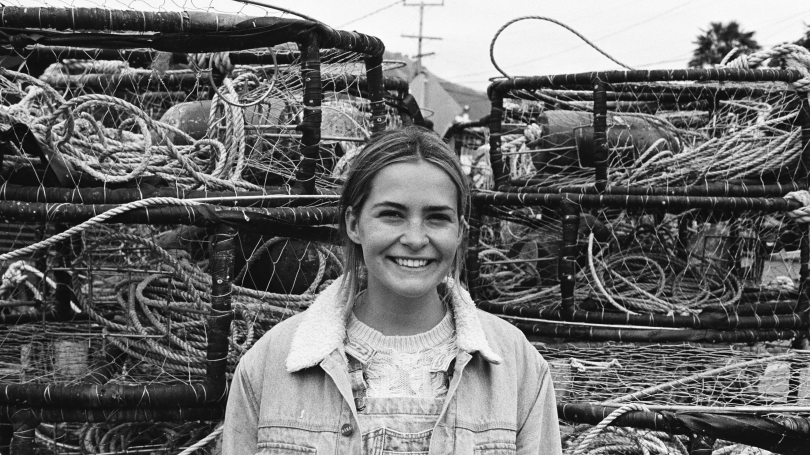
- About
- Application Process
- Fellowships
- News & Events
Back to Top Nav
Back to Top Nav
Back to Top Nav
Abbey Cahill '18 studied creative writing at Dartmouth with, among others, Jeff Sharlet, Cynthia Huntington, and Terry Osborne, enormous influences in her beautiful constellation of mentors. After graduation, she moved to San Francisco, where she worked in various communications roles, first in software and then in climate consulting. The band-aid solutions to the climate crisis that she saw in the news and in the workplace all too often relied on techno-solutionism and pay-to-pollute mechanisms like carbon offsets.
The change Abbey hoped to see was, and is, in shifting mindsets—away from consumption, individualism, and the hedonic treadmill of fast living, and toward a more compassionate, connected, and grounded approach to wellbeing. She took what she calls an adult gap year, taking service and retail jobs that familiarized her with the daily lives of people in her community, riding her bike to work each morning and spending time immersed in public spaces like parks and libraries. When Abbey moved to Boston and had a baby girl, she discovered her own sense of community.
Still, she had the urge to "make something." On the west coast, Cahill was inspired by place-based journals like "The Inverness Almanac," based out of West Marin, and the "Desert Oracle," based in Joshua Tree. In Boston, Abbey looked for similar publications and couldn't find any.
So, she decided, with the help of a Dartmouth Postgraduate Project grant, to start one.
The Quinobequin Review, The Q, is Boston's first literary and arts journal created for the Charles River Watershed area. The journal's name comes from the pre-colonial contact name for the river, in the language of its Massachusetts, Wampanoag, and Pawtucket stewards. It means "meandering."
In an exuberant Instagram post announcing the first issue in September 2023, Cahill wrote: "We started The Q because we believe that where we live is absolutely central to who we are. In a world more transient than ever before, it is so important to reroot and connect to where we live. This is an old place, full of stories. We can't wait," she addressed future contributors, "to hear yours."
In an interview published on substack, Abbey described her hopes for The Q: "There's a lot of writing about our current disconnect from the landscape and how it might be solved using ancestral wisdom or reimagining the future, but so much of that writing tends to be academic and abstract. I just want The Q Review to be a tangible, fun, zany, weird, and accessible way to get to know where you live. I want people to be able to pick it up and read about some piece of folklore that's attached to a place twenty minutes away or some leaf they can pick in the woods to make tea in the winter. I want it to feel joyful and weird and specific and hopeful."
"I thought I wanted to be a solitary writer, holed up by a wood stove." But since college, Abbey has learned that she is more extroverted than she thought, and The Q, with contributions from scientists, artists, poets, and activists, has grown a community engaged in readings, salons, and events. Through her work on The Q, Abbey has created an outlet that combines her love for writing with her interest in environmental stewardship and design. In addition to her required English major courses, she spent a lot of her time as an undergraduate taking environmental studies and studio art classes. "At the time, I thought these were just personal interest classes, but looking back, I can see how my studies at Dartmouth are so aligned with what I do now," she says, remembering the countryside around Dartmouth and the class trips she took with Osborne's class.
The Q is only published in print. The fifth issue will drop on March 20, the day of the vernal equinox. Cahill is determined to represent many different ethnic, religious, and socioeconomic perspectives and ways of describing relationships with the watershed. "My biggest challenge," she says, "is holding myself to the standard of a time capsule—capturing the essence of this place."